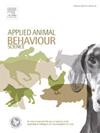Hold your horses: The effect of play behaviour in horses (Equus caballus) under imposed stress
IF 2
2区 农林科学
Q1 AGRICULTURE, DAIRY & ANIMAL SCIENCE
引用次数: 0
Abstract
Horses (Equus caballus) are prone to acute and chronic stress, particularly in equestrian sports, raising significant welfare concerns. We investigated whether and how play can mitigate acute acoustic stress and enhance decision-making in horses. We studied horses in two different stabling and working conditions (intensively vs. extensively managed) and recorded their behaviours in a Y maze for a food reward in three sequential treatments: baseline (no stressor), stress (exposure to a short-term acoustic stressor) and solitary object play with a large ball (exposure to the stressor followed by play). We recorded behavioural diversity, latency to approach the decision point (before choice) and food reward arm, behaviours associated with positive and negative emotional state and overall choices made (decisions) in the maze. Decision-making was significantly better in the play treatment than in both the baseline and stress treatments. Horses in the stress treatment exhibited a greater diversity of behaviours associated with negative emotional states and poorer decision-making compared to the play and baseline treatments. Additionally, intensively managed horses under more constrained conditions, were more stressed than those extensively managed. Our findings suggest that play can effectively reduce stress and improve decision-making in horses, depending on their housing conditions, and highlight the importance of play for equine welfare.
Hold your horses:在施加压力下马(Equus caballus)的游戏行为的影响
马(Equus caballus)容易受到急性和慢性压力,特别是在马术运动中,引起了重大的福利问题。我们研究了玩耍是否以及如何减轻马的急性声应激和提高决策能力。我们研究了两种不同的马厩和工作条件下的马(集中管理和广泛管理),并记录了它们在Y形迷宫中获得食物奖励的行为,分为三种顺序处理:基线(无压力源)、压力(暴露于短期声压力源)和单独物体玩大球(暴露于压力源后再玩)。我们记录了行为多样性、接近决策点(选择前)的延迟时间、食物奖励臂、与积极和消极情绪状态相关的行为以及在迷宫中做出的总体选择(决定)。游戏治疗组的决策能力明显优于基线治疗组和压力治疗组。与玩耍和基线治疗相比,压力治疗中的马表现出与消极情绪状态相关的更多的行为多样性和更差的决策。此外,集中管理的马在更有限的条件下,比广泛管理的马更紧张。我们的研究结果表明,玩耍可以有效地减轻马的压力,提高决策能力,这取决于它们的住房条件,并强调了玩耍对马福利的重要性。
本文章由计算机程序翻译,如有差异,请以英文原文为准。
求助全文
约1分钟内获得全文
求助全文
来源期刊

Applied Animal Behaviour Science
农林科学-行为科学
CiteScore
4.40
自引率
21.70%
发文量
191
审稿时长
18.1 weeks
期刊介绍:
This journal publishes relevant information on the behaviour of domesticated and utilized animals.
Topics covered include:
-Behaviour of farm, zoo and laboratory animals in relation to animal management and welfare
-Behaviour of companion animals in relation to behavioural problems, for example, in relation to the training of dogs for different purposes, in relation to behavioural problems
-Studies of the behaviour of wild animals when these studies are relevant from an applied perspective, for example in relation to wildlife management, pest management or nature conservation
-Methodological studies within relevant fields
The principal subjects are farm, companion and laboratory animals, including, of course, poultry. The journal also deals with the following animal subjects:
-Those involved in any farming system, e.g. deer, rabbits and fur-bearing animals
-Those in ANY form of confinement, e.g. zoos, safari parks and other forms of display
-Feral animals, and any animal species which impinge on farming operations, e.g. as causes of loss or damage
-Species used for hunting, recreation etc. may also be considered as acceptable subjects in some instances
-Laboratory animals, if the material relates to their behavioural requirements
 求助内容:
求助内容: 应助结果提醒方式:
应助结果提醒方式:


